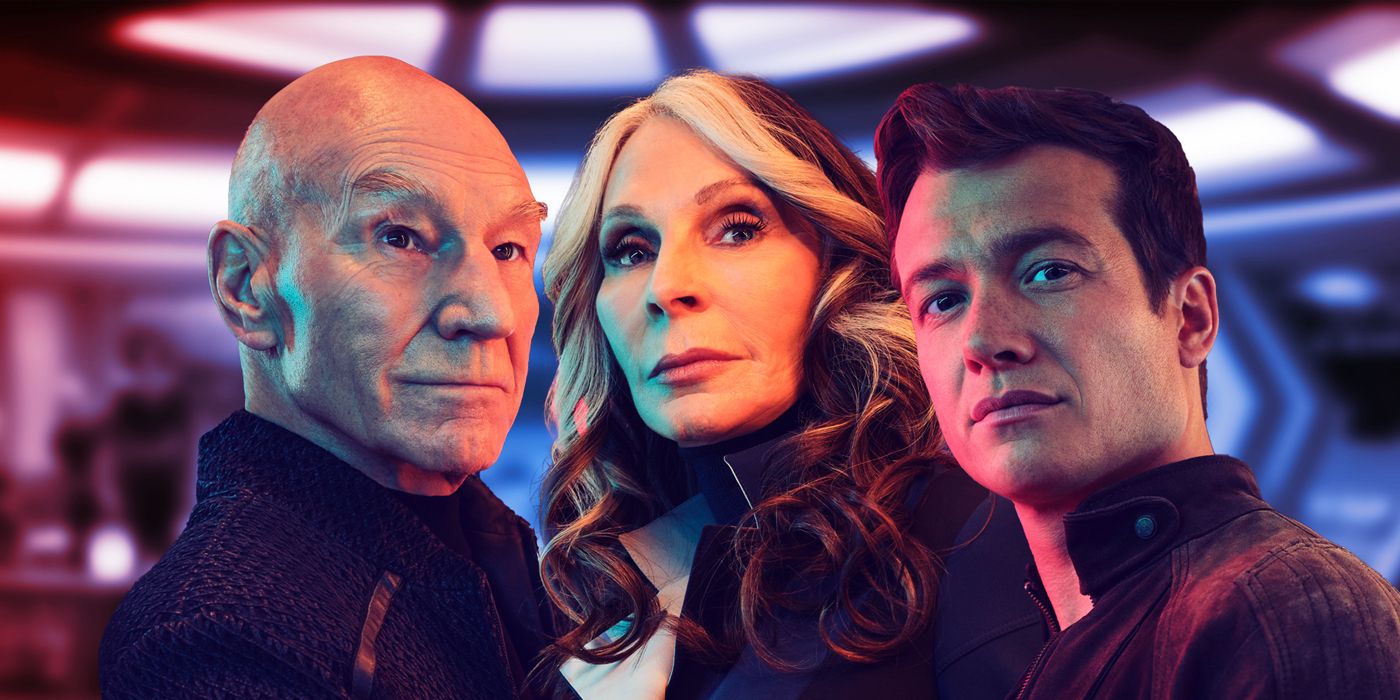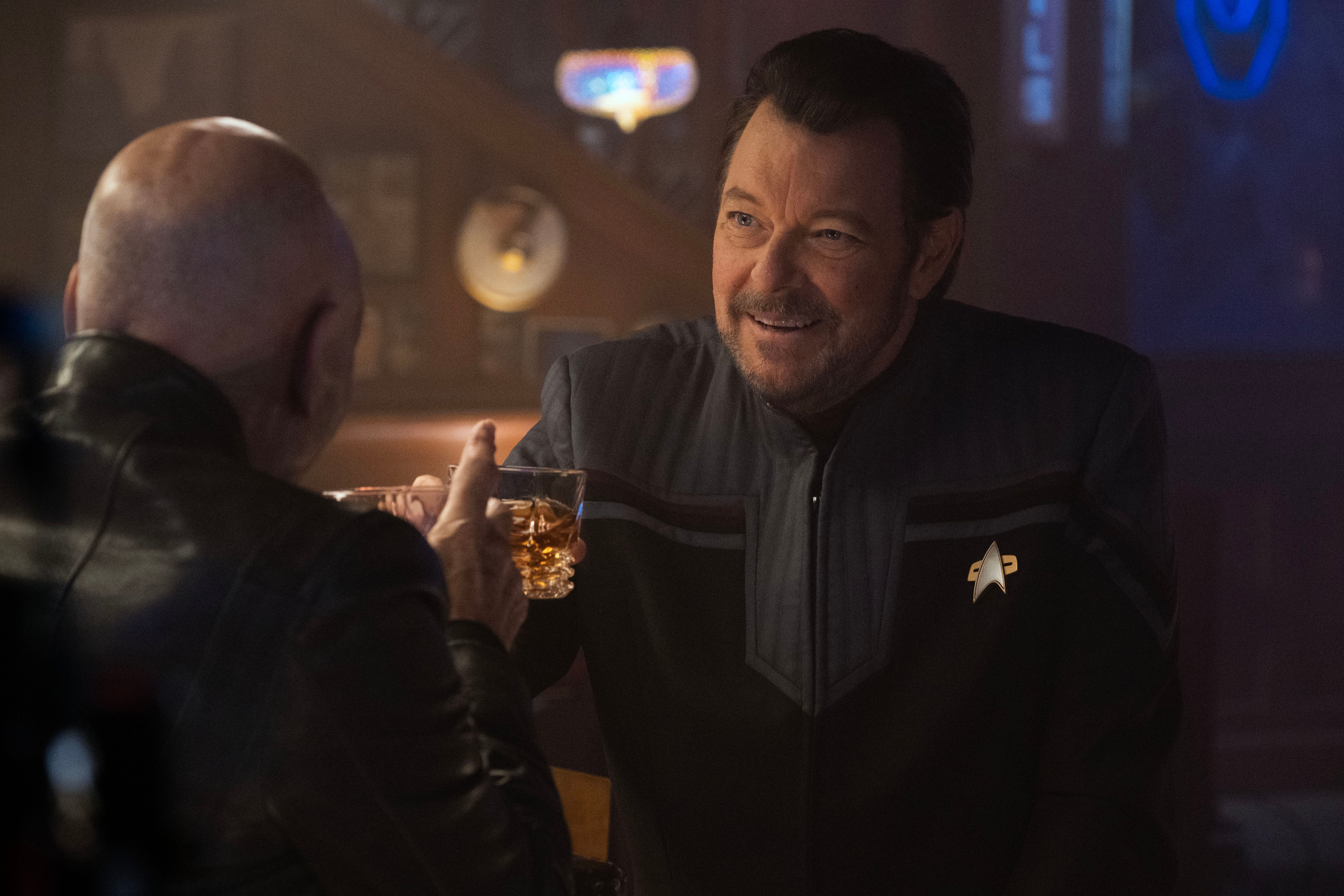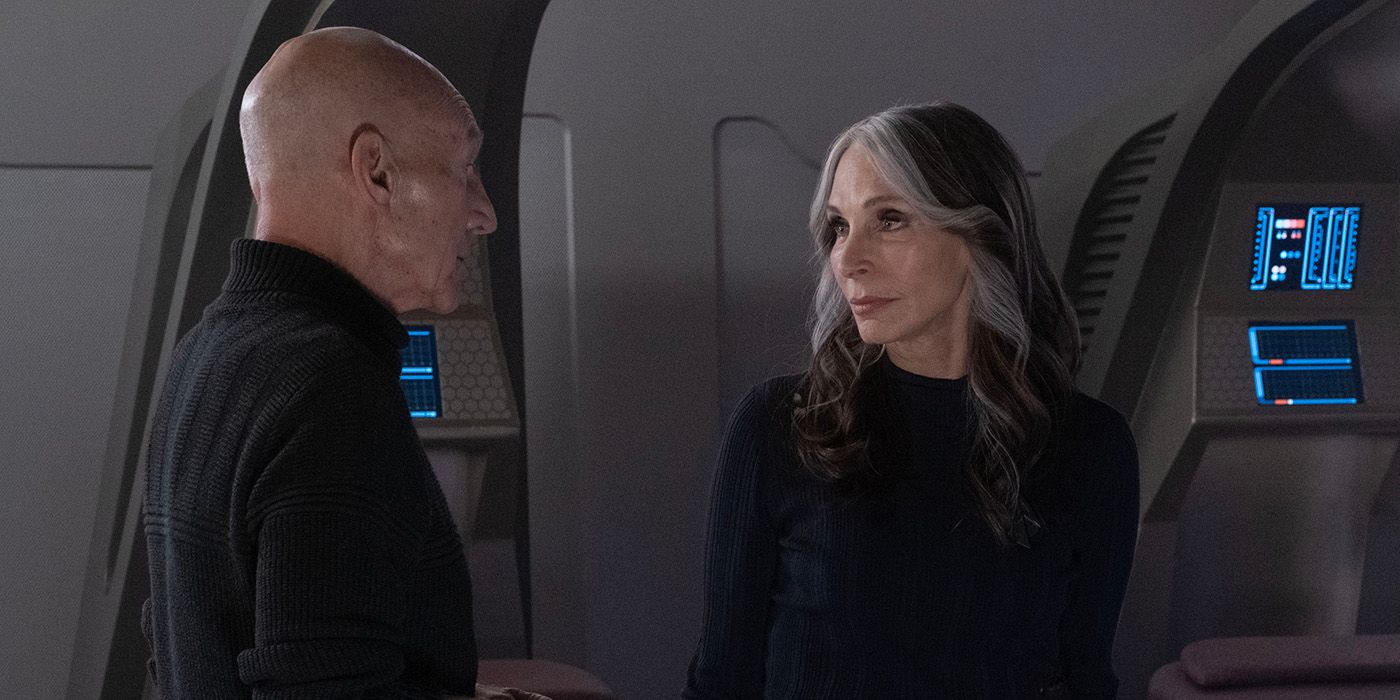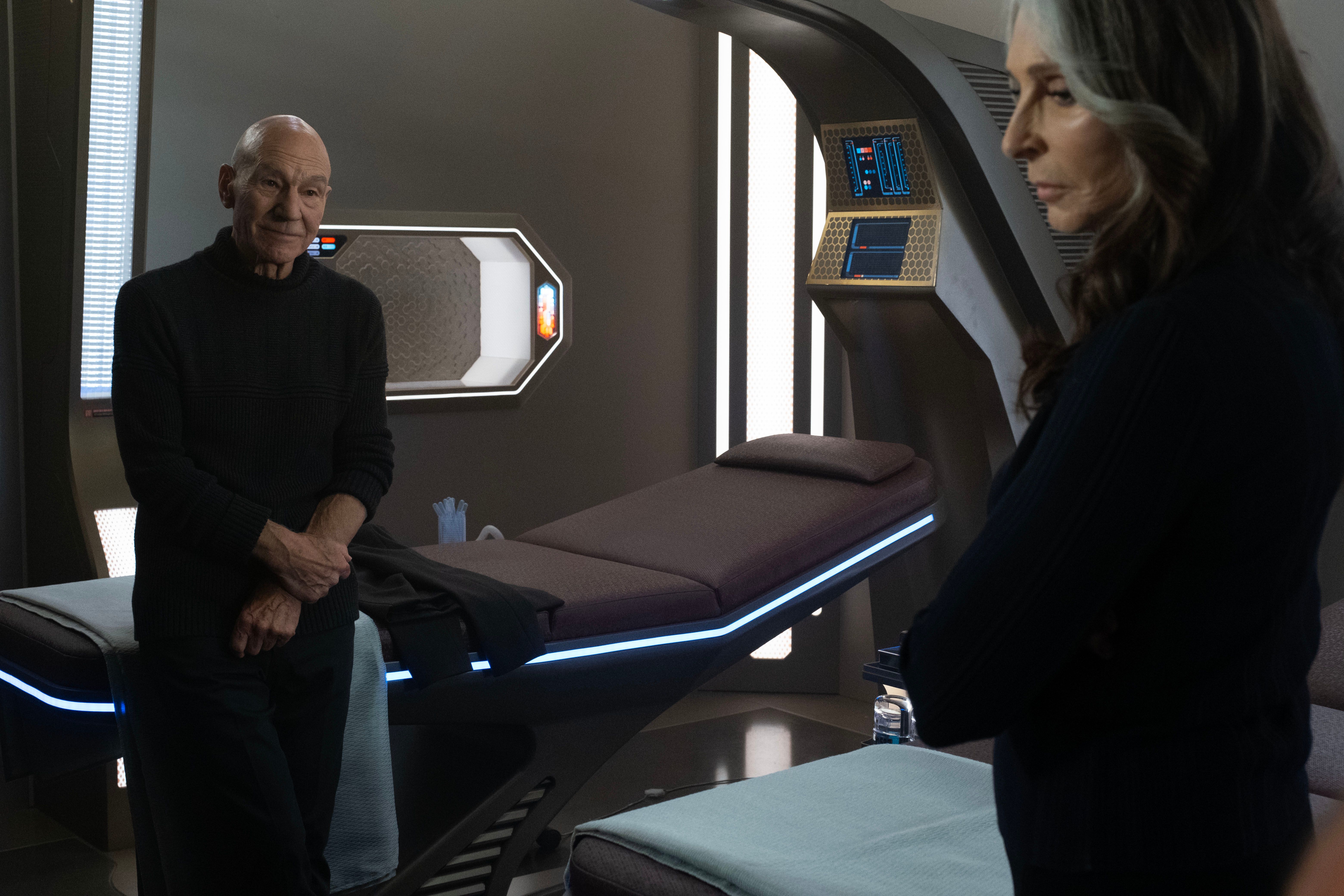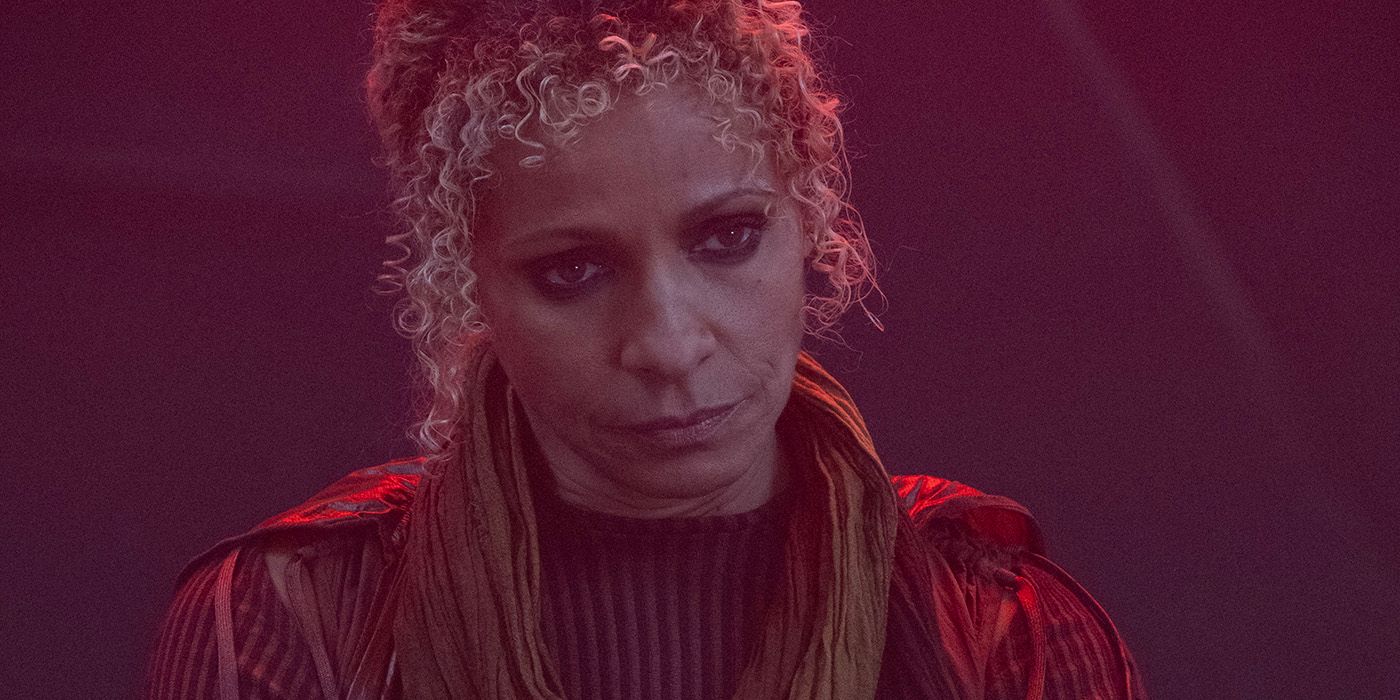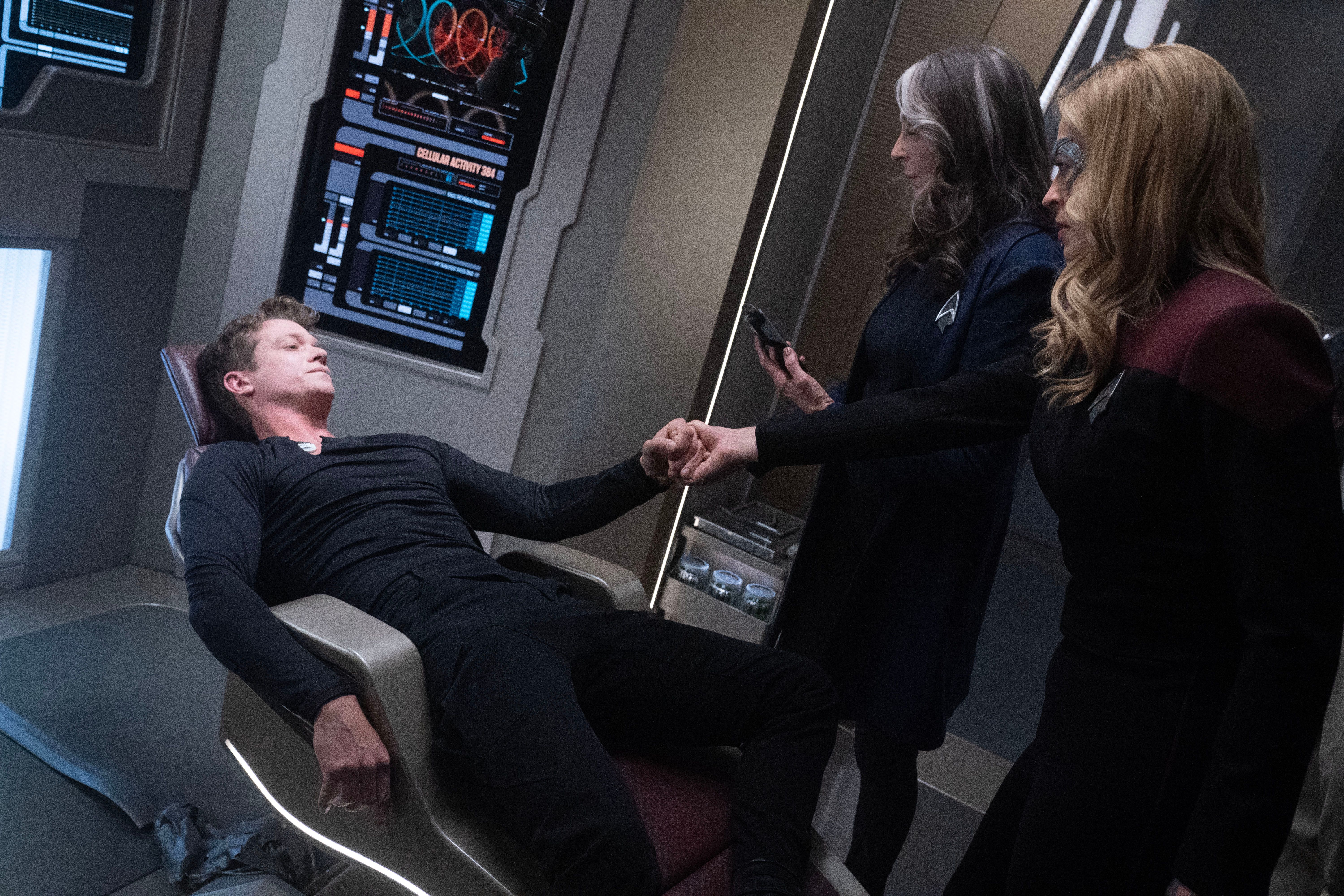The third episode of Star Trek: Picard Season 3, entitled "Seventeen Seconds," ramps up the stakes as the crew of the U.S.S. Titan is pursued deeper and deeper into the dangerous nebula, and with those heightened stakes emotions are running high too. On the heels of the revelation that Beverly Crusher (Gates McFadden) and Jean-Luc Picard (Patrick Stewart) had a son, Picard finds himself in an emotionally volatile state as he is forced to reckon with the reality of Jack's (Ed Speleers) existence. The episode, penned by Jane Maggs and Cindy Appel, neatly bookends Riker's (Jonathan Frakes) own grief for losing his son years ago, with a near-death experience that really puts things into perspective for Picard.
Ahead of the episode dropping on Paramount+, Collider had the opportunity to catch up with Picard's showrunner Terry Matalas to discuss the increasing stakes, unpack Crusher's decision to conceal Jack's existence from Picard, the evolution of Riker and Picard's friendship, that ominous red room moment, favorite moments, and where things will head in Episode 4.
COLLIDER: The flashback with Picard and Riker in this episode is one of my favorite moments in this season because it connects so nicely with everything that Picard goes through in this episode, especially with the follow-through of the turbo lift down to the Sick Bay. It's just chef's kiss. So I'm really curious to know how this idea came up in the writer's room and how Jane [Maggs] and Cindy [Appel] took off with it because it's just it's so well done.
TERRY MATALAS: Well, it's all about how much we want to do in 50 minutes, and a lot of my shows I pack a lot in and try and take these characters as far as we can in that time. So that required re-establishing Riker as a man who lost his son and seeing the journey of the joy of a father who just discovered those feelings and sharing them with his new friend, and then juxtaposing that with who Picard is now in his discovery, and Picard feeling a rejection from his own son. As Beverly said, “He chose not to know you,” and thereby, almost, Picard in return rejecting him. So Riker has these very strong feelings. So to really illustrate all those emotional turns that are then going to permeate those two men on the bridge, it felt like the right thing to do. To see them in that moment of joy, in the beginning, to help illustrate everything in the backend.
It works very well. I love flashbacks that are used smartly and these are done just so well to carry those themes forward. I also really love, at the top of the episode, that we have Seven listening to, essentially, broody music while she's stuck in her quarters. And I love music in general. I just love the way that it showcases who characters are. So I was curious to know if there was any specific thought that went into what kind of music Seven listens to when she's alone in her quarters?
MATALAS: In that case, we were trying to juxtapose the mood of terror and stress on the bridge with what she might be listening to, and almost a soothing choral piece. And then, where she might have found that influence, we kind of felt like it was probably Janeway, so you cut to the Voyager immediately. As if, almost, Seven of Nine is trying to calm her anxious nerves as she's fixing some device, and it's not working, clearly, because she throws the thing down.
[There are] lots of things, but mostly it starts from… It wasn't in the script, she wasn't listening to music. It started, actually, in editorial where we needed to transition from people on the shift change from Sydney heading to Seven of Nine’s quarters, and my editor Drew Nichols and I love to drop in music shift changes to just give a feeling in the hopes of elevating the peace, and that was one of the things we did there.
You mentioned the Voyager figure. There are a lot of nice little, personal items in her quarters. Are there any Easter eggs hidden in there? I know there's the game, the figure, there are a couple of little things there.
MATALAS: Yeah, Kal-toh is somewhere, the Kal-toh card game is somewhere, the Voyager, [there are] a couple of other things, but unfortunately the camera doesn't linger on any of them. There's no Chakotay body pillow.
No! Oh gosh, you’re gonna break all the fans’ hearts. Going to Picard and Beverly, I really love this moment where they talk about how the relationship fell apart. What do you think it is about their relationship that has lingered in the hearts of fans for decades now?
MATALAS: Well, it's the will-they-won’t-they of 1990s television. The insecurity of television producers to not put those characters together creates a frustration in fans. The second you create that romance, you have to commit to it and then either destroy it later in the series or serialize it. Nobody wanted to do that back in those days, not Rick Berman, certainly not Patrick Stewart. I'm sure Gates probably would have been all for it, and it would have been an amazing exploration of that. It's the same thing with Mulder and Scully, right? And so what ends up happening is you create this incredible frustration of fans, and it never happens.
Now television has evolved. Now, you can explore that, for better or worse. I mean, I'm sure there are many people right now who would also be like, “God, I wish they were not doing the secret son of Crusher and Picard,” but it makes for great drama now, in older, evolved television, especially when you see where it goes, what it truly becomes.
Did you feel a certain degree of pressure to fill in those blanks while working out that timeline between the last time we saw them and the creation of Jack?
MATALAS: We did, right? So, it comes up all the time. Does Jack’s age work how old Ed Speleers is? No. Ed Speleers is an amazing actor, and we all should look as good as Ed Speleers does. When we were in our 20s, we wish we looked as good as it does now. So we wanted Ed Speleers. The age doesn't work right. Does it make perfect sense exactly when she would have left the Enterprise 20-something years…? Did she go and work for Starfleet Medical from a deleted scene in [Star Trek: Nemesis]? It was a deleted scene. So we have to decide that that didn't exist, right?
Also, I believe Picard is technically 96. You know, the ideas of conception and contraception get brought up in the room, but then again, we're in the 25th century, is it even an issue? At some point, you have to let all this go and just let the story exist or not exist. I will say, personally, it is pretty frustrating for me to get pounded by those questions, or nitpicks, on Twitter. But again, Star Trek attracts science and mathematical inspection. It's going to attract people who love those details, but I don't think Star Trek ever really works well as a historical record. So at some point, you have to choose the story over the cataloging of a canon calendar.
It's so funny, too, because I mean, how many TV shows have people in their late twenties, early thirties playing like 15-year-old teenagers?
MATALAS: I mean, Beverly Hills, 90210.
Even I have played a middle schooler before when I was in my mid-twenties. So it happens. It's television. I, personally, think it works great.
MATALAS: It gets brought up, and then it starts to go away the more you spend time. That question now has faded. As Episode 3 is aired, people start just like, “All right, I'm just gonna go with it.”
They're hooked on the story now, and they're willing to overlook it. In this episode, I thought that Shaw was going to bite it. I was like, “That's it. We're not going to get a good arc for Shaw.” I was so afraid that this was it for him. Who do you think is the most guilty in that moment when Shaw is grievously injured? Picard or Riker?
MATALAS: You mean when they're looking at him? Boy, I think they both feel some level of guilt. But I do think—I do know, I should say—that had Riker and Picard not gone on this adventure and not quasi-commandeered the Titan, they would not have uncovered this changeling conspiracy and the galaxy would be in serious trouble. So in retrospect, their ill-advised insubordination might have saved the world, but we'll have to see.
Picard is so bound and determined in this episode to fight the Shrike, even after they learn about the portal weapon. It's very reckless, it's very foolhardy. It's very interesting to see Picard and Riker so at odds, and kind of like a bit of a flip of their characteristics, and it works really well. He's so impulsive in this moment. What is going on in his head? Is this him acting out because of the whole Jack of it all, or what is it that's happening for him?
MATALAS: He's angry, he's angry, and not necessarily tactically wrong. So the way we looked at it in the writer's room was, both men would have a tactical perspective and each one of those perspectives would be amplified with how they were feeling. For Riker, he would want to get the ship home and protect it, but he was amped up by his feelings of loss for his son, and watching Picard reject his son would make him feel overprotective. And for Picard, this feeling of rejection from his own son, and everything he learned from Beverly, would make him angrier and want to fight. So they're bringing in a lot of baggage onto the bridge, but neither men are right and neither men are wrong about it. They're just, also, wildly outgunned. And so it becomes a kind of no-win scenario in that way.
I love that we get this moment with Riker and Picard where they butt heads. That they are at odds with each other, and they lash out at each other. It's really refreshing to see because I feel like in the duration of the Next Generation they get along very well. There's no real tension between them, and it's great to see this because it makes the humanity of it all. What went into that decision to be like, “No, they're going to butt heads, they're going to say things that they're going to regret.”?
MATALAS: We had never seen that. So early on when we were conceiving the season, I went out to lunch with Patrick and Jonathan, and I pitched this idea and took them through the emotions that they would be feeling. I told them that we would be essentially doing a kind of Run Silent, Run Deep in which they would not see, tactically, the same way.
We've never seen these two men on the bridge before in this dynamic. We've never seen Riker truly in the captain's chair as a captain making the hard choices, especially with his old mentor right there. Ideally, this would be something you would slow burn, and/or style over the course of two or three episodes. We don't have that luxury here to do it, we have 50 minutes, and not even that. You basically have 25 minutes to do it. And so it meant that these two could really go at it, and I needed those two to be comfortable with it. They loved the idea because it was something that Gene [Roddenberry] wouldn't really let them do, that they never really had the opportunity to do, and it was different.
We also knew it was risky. That there would be a contingent of fans that wouldn't feel as though these characters would ever do that. And as fans writing it, we feel that responsibility, as well as to make it as authentic as possible. And in the next episode, they're going to have a long conversation about it, about why both men are feeling what they're feeling, and certainly, there's a resolution that I think is satisfying for both of them. But that's the key to drama is, you can't feel good unless you felt bad first, and so that was how we did it.
And it works very well. I mean, these men have been friends for 40 years. Of course, they're going to have their quibbles and their disagreements.
MATALAS: And they change. Many people change.
Exactly.
MATALAS: I do want to say, that's the hard thing about dealing with legacy characters that are beloved like this is, there is a part of you that just wants them to be what they were in 1993, and they're not. So you have to choose to either not watch it and stay in your headcanon, and they will always be who they were at the end of “All Good Things…”, or you can come in now and accept the fact that these are either alternate versions in your headcanon of these characters, and you can watch it and enjoy it, or they are who they are.
I like that kind of storytelling. I really like to see characters who have evolved and grown and reacted. I don't like stagnant, you know? Something else I really liked in this episode was that Jack and Seven got to team up a little bit. Whether it's Picard or through the comics, I've always thought that Seven saw Picard as a sort of father-like figure, and maybe it's because of the Borg connection, and they understand each other in a way that other characters didn't. But to me, it kind of felt like, “Oh yes, like this like there's a sibling dynamic there that I've been craving for Seven.” What can you tease about Jack and Seven's dynamic through the rest of the season?
MATALAS: Well, they're both kind of the outsiders. You know, she was the Fenris Ranger, he's been on the outside, as well, on the fringe areas of the galaxy. And so he knew just who to go to who would understand this tactic that someone, a saboteur, might be using on the ship. And they have incredible chemistry, Ed and Jeri. Like, you just want to see more of them. Yeah, it is, it's almost like a brother/sister, or Auntie Seven kind of dynamic, which is pretty great. They have one of my favorite scenes in the season in Episode 6, where—you know the scene because you've seen it—where they will get into more of her past, and her rebirth. It's a lovely bonding moment between the two of them.
So I've been obsessively rewatching Enterprise because Paramount hooked me up with a sweet subscription to Paramount+. So I went straight to Enterprise because I love that when I was younger. It cracked me up because there's the connection of M’talas Prime. How did you get a planet?
MATALAS: How did I get that? So, I was an assistant to Brannon Braga on Enterprise, and the writers were trying to name this horrible, vile place, and they thought it would be fun to troll me and name it after this young assistant. They brought it up a few times. I think it was either Chris Black or David Goodman who named it, and they brought it back a few times in the thing. So when we got to this season, I can't remember if it was our script coordinator, Oliver Greg Grigsby, or if it was Kiley [Rossetter], our writer, who suggested it should be M’talas Prime.
Yeah, but people think I'm flexing. When they watch it, they're like, “Fucking showrunner named a planet after himself.” I'm like, “I'm not that cool guys.” It literally was a throwback. That's why I added the apostrophe, to hide it. But I did like that it called back… I was trying to be self-deprecating, but I think maybe in some ways it backfired.
It was great. I was like, “Wait a second, that's the same planet, or the same system, in Picard!”
MATALAS: Yes, yes, it was that was the idea.
Shaw wasn't the only character in this episode that I thought was really close to biting it. How important was the journey into fatherhood for Picard, for him to have this moment where he thinks he's losing his son before he's even gotten the chance to really accept that he has a son?
MATALAS: Very, very important, right? You have 10 episodes, which is not a lot of time. So if Jack and Picard are ever going to have a relationship – which is hanging by a string, they do not know each other at all—they have a lot of territory to cross. And to have Picard suddenly see the potential of losing the son, now he sees tangibly, he has a son, and he could die, and to look at Beverly and his son in the same moment would shock him into feelings that he might have been repressing. And then in the next episode, those feelings will come out more strongly.
I'm really fascinated by the whole Red Room, red tendrils, the red stuff that's happening for Jack. Is this something that we should be going through our captain's logs and looking at old stuff, or is this something that's entirely new? I have to say that as a really obnoxious British literature nerd, my first thought was the red room in Jane Eyre. I was like, “Oh, is this that kind of like literary illusion?” Because that's my wheelhouse. But I'm really curious to know, is this something that we have maybe a frame of reference for, or something that we're starting fresh with?
MATALAS: I would say keep watching, is what I would say.
Were there ever any other color choices that you thought about going with? Or is it just red because it's such a visceral, vibrant color?
MATALAS: Red just ties into a lot of imagery at the end of the season. If you know my previous work, it's something that's just weirdly in my DNA. I don't know why I can't really tell you. And my editor, too, Drew, and my writers, my 12 Monkeys writers, we all sort of have this nightmarish vision for certain things that we pull in. There's a little bit of a horror aspect to what's going on with Jack, and so that ties in quite a bit too.
Do you have any favorite moments or favorite Easter eggs from Episode 3?
MATALAS: My favorite emotional moment is when Worf says he was contacted by a friend within the Great Link, and you just wish René Auberjonois was around so that we could honor that more. What else? That's probably the only one.
That's a good one. What can you tease for fans who just finished watching Episode 3 for what's coming in Episode 4?
MATALAS: Episode 4 will give you some emotional relief to the struggle of these first three episodes. It will answer questions, it will ask new ones. It will make you feel joy and also reopen up your heart with pain as well. In a weird way, it's a proper conclusion to the first act of this movie.
The first three episodes of Star Trek: Picard's third season is streaming now on Paramount+.

